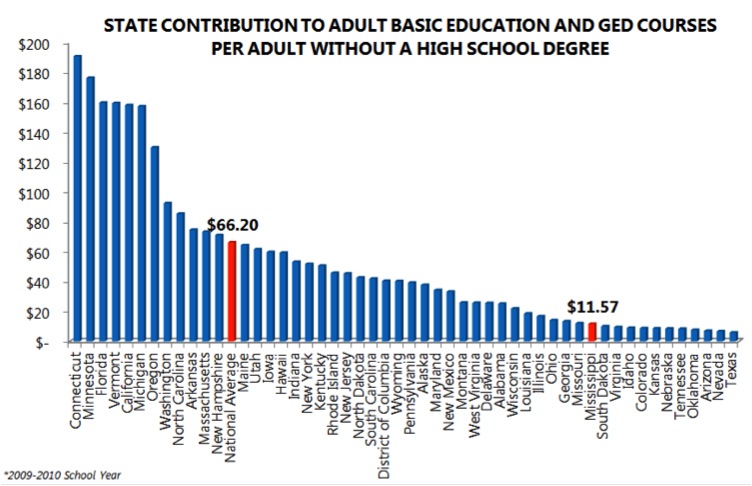How Does Mississippi Stack Up On Adult Education Spending?
November 27th, 2012
Earlier this fall the Policy Matters Blog covered substantial changes in GED testing that are coming in 2014. Students will begin taking a different series of assessments and tests will become computer based. The new test will also cost students $120, a 60% increase over the current fee. To ensure Mississippi students are prepared for the changing GED test, GED programs on community college campuses and throughout the community will have to adjust to the new demands. Adequate resources for student support, instructors, and test fee scholarships will also become increasingly important over the next year.
How does Mississippi stack up on adult education spending?
Adult Basic Education programs and GED programs provide courses to Mississippi residents without a high school degree. Courses start with basic literacy and math skills and build to GED test preparation. During the 2009-10 school year, the state allocated approximately $3.6 million to state administered adult education programs.¹ While these resources provide critical funding for adult education programs, the appropriations falls well short of what is needed to connect the hundreds of thousands of adults without a high school degree in Mississippi with a GED. In 2010, Mississippi spends $11.57 per adult in the state without a high school degree. The amount is equal to 1/6 of the national average and ½ of what Alabama spends for the same population (see chart).
 How the state decides to move forward with funding the needs of adult education programs will affect the resources available for adults- many of whom will struggle to access quality wages and job stability without a high school degree. Funding for GED programs also has the potential to better connect resources with strategies that move more students not just to a GED, but on to college enrollment. Moving more GED recipients into college courses is critical to meeting goals set by the Mississippi Graduation Rate Taskforce. The Taskforce has set ambitious goals of producing an additional 147,000 college degree holders beyond current rates− equal to an additional 1,000 degrees a year until 2025.
How the state decides to move forward with funding the needs of adult education programs will affect the resources available for adults- many of whom will struggle to access quality wages and job stability without a high school degree. Funding for GED programs also has the potential to better connect resources with strategies that move more students not just to a GED, but on to college enrollment. Moving more GED recipients into college courses is critical to meeting goals set by the Mississippi Graduation Rate Taskforce. The Taskforce has set ambitious goals of producing an additional 147,000 college degree holders beyond current rates− equal to an additional 1,000 degrees a year until 2025.
Mississippi needs to ensure more resources are available to GED programs and targeted at strategies that prepare students for the new GED and at moving students onto college enrollment. Doing both will be critical to the economic success of thousands of working adults and Mississippi’s workforce competitiveness in the years ahead.
Author: Sarah Welker, Policy Analyst
¹Working Poor Families Project analysis of data from the U.S. Department of Education, Office of Adult and Vocational Education.





